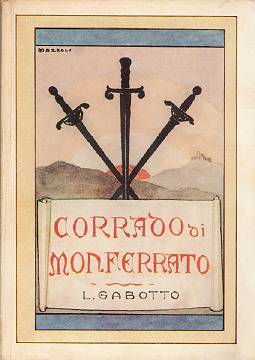

Fortunately, if you read Italian, there is an antidote to Graham Shelby - not great literature, but better than nothing:
Luigi Gabotto, Corrado di Monferrato
It's billed as a Racconto Storico - i.e. a historical novel, but it doesn't quite succeed as fiction.
The author was an elderly academic/local historian/man of letters and Monferrine patriot; but this book wasn't published commercially, but by the Rotary Club of Casale Monferrato, in 1968.
My first impression is that he would have been better writing it as a straight biography of Conrad. The fictionalisations don't make the story jump off the page in a lively fashion; they're just there to add a few bits of dialogue and fill in a few gaps, such as the first wife, about whom absolutely nothing is known. (Gabotto calls her 'Eleonora di Montalero' and has her raped and slaughtered in an attack on her parents' castle in 1172, leaving our dashing young hero heartbroken - although the historical evidence suggests that the mystery lady was still living in 1179, and died of unknown causes c. 1185-86, after which Conrad took the cross but got slightly sidetracked to Byzantium.)
Some parts of the story are written as straight history, with quotes from other writers, notably Usseglio. The effect overall is of a vie romancée - that odd hybrid which falls between biography and biographical fiction. Conrad's older brother William Longsword, Sibylle and Guy all appear, of course, although William is said, incorrectly, to have been murdered after 3 years in Outremer (he died of an illness, probably malaria, after just enough months to get Sibylle pregnant with Baudouinet: it was poor little kid-brother Renier who was poisoned after 3 years in Constantinople).
Having said this, it is a pleasant enough book, and it is good to see a positive treatment of Conrad's life. And the reader cannot fail to be heartbroken by the final tragedy: the uncrowned king set upon in the street by Assassins, wounded in the side, and taken home - dying in agony - to his pregnant wife. (Let me through, I'm a doctor...)
Gabotto quotes the trobador Peirol's description of Conrad as "valente e prode" - "valens e pros" in the original Occitan. One can't say much fairer than that (although Kay called him a "hottie" when I read her Niketas Choniates' description of him over the phone...;-D)!
Return to Top
Back to
TOP

